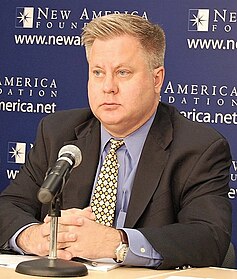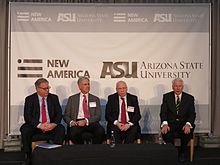fiction.wikisort.org - Writer
Michael Lind (born April 23, 1962) is an American writer and academic. He has explained and defended the tradition of American democratic nationalism in a number of books, beginning with The Next American Nation (1995). He is currently a professor at the Lyndon B. Johnson School of Public Affairs at the University of Texas at Austin.
Michael Lind | |
|---|---|
 (2009) | |
| Born | April 23, 1962 Austin, Texas, U.S. |
| Education | University of Texas at Austin (BA) Yale University (MA) University of Texas Law School (JD) |
| Occupation | Writer, academic |
Early life
Lind is a fifth-generation Central Texan, of Swedish, English, Scottish and possibly German Jewish descent.[1] Born in Austin, he was educated in Austin public schools. His father, Charles Ray Lind, was an assistant attorney general of Texas, and his mother, Marcia Hearon Lind, was a public school teacher and principal. He attended the Plan II Liberal Arts Honors Program at the University of Texas at Austin, graduating in 1982 with honors. He received a master's degree in International Relations from Yale University in 1985 and a J.D. from the University of Texas Law School in 1988.[2][3]
Career
Lind worked for the Heritage Foundation's State Department Assessment Project from 1988–90.[4] After working as assistant to the director of the U.S. State Department's Center for the Study of Foreign Affairs from 1990–91, he was executive editor of The National Interest from 1991–94. He was an editor at Harper's Magazine from 1994–95, a senior editor at The New Republic from 1995–96,[5][6] a staff writer at The New Yorker from 1996–97,[7][8][9] and Washington Correspondent for Harper's Magazine from 1998–99.[10]
In 1999 he co-founded the New America Foundation (now New America) with Ted Halstead, Sherle Schwenninger, and Walter Russell Mead. At New America from 1999–2017 he was at various times Whitehead Senior Fellow, co-founder and co-director of the American Strategy Project, co-director of the Next Social Contract Initiative and an ASU Future of War Fellow.[11]
Since 2017, he has been a professor at the Lyndon B. Johnson School of Public Affairs at the University of Texas at Austin.[12] He has taught courses on American democracy, American political economy and American foreign policy at Harvard, Johns Hopkins, and Virginia Tech's Arlington campus.[11]
Views

Lind has examined and defended the tradition of American democratic nationalism associated with Alexander Hamilton in a series of books, including The Next American Nation (1995), Hamilton’s Republic (1997), What Lincoln Believed (2004) and Land of Promise: An Economic History of the United States (2012). Lind has also written two books on American foreign policy, The American Way of Strategy (2006) and Vietnam: The Necessary War (1999). A former neoconservative in the tradition of New Deal liberalism; with the original neoconservatives being anti-Soviet liberals who drifted to the right, Lind criticized the American right in Up From Conservatism: Why the Right is Wrong for America (1996) and Made in Texas: George W. Bush and the Southern Takeover of American Politics (2004). According to an article published in The New York Times in 1995, Lind "defies the usual political categories of left and right, liberal and conservative."[13]
In 1995, Lind criticized the systems of jury trials and common law, arguing that civil law trials are superior to common law trials, and that the civil law model of a mixed panel of professional and lay judges is preferable to juries. On the history of trial by jury in the United States, he wrote that "from independence until the civil rights revolution, the jury was a means by which white bigots legally lynched Indians, blacks and Asians (or acquitted their white murderers). Today urban black juries all too often put race above justice in the same manner." He argued that among other things, the process of discovery was much fairer in a civil law system.[14]
In May 2015, Lind argued for the adoption of "enlightened nationalism", also called "liberal nationalism", in which the United States "would combine its security strategy of offshore balancing with intelligent economic nationalism". Regarding NATO and other American allies, a liberal nationalist foreign policy, Lind continued, "would shift much of the burden of the defense of its allies and protectorates to those countries themselves". He has argued for "an immigration policy in the national interest would shift the emphasis from family reunification to skills ... [and] enable long-term population growth ... compatible with the economic integration and cultural assimilation of newcomers to the United States".[15]
Lind is an outspoken critic of libertarianism. He had observed that of the 195 countries in the world today, none is fully a libertarian society:
If libertarianism was a good idea, wouldn't at least one country have tried it? Wouldn't there be at least one country, out of nearly two hundred, with minimal government, free trade, open borders, decriminalized drugs, no welfare state and no public education system?[16]
Works
Nonfiction
- (2020) The New Class War: Saving Democracy From The Managerial Elite. Penguin Random House. ISBN 9780593083697.[17]
- (2018) Big Is Beautiful: Debunking the Myth of Small Business (with Robert D. Atkinson). MIT Press. ISBN 9780262037709.[18][19]
- (2012) Land of Promise: An Economic History of the United States. HarperCollins. ISBN 9780062097729.[20][21]
- (2006) The American Way of Strategy: U.S. Foreign Policy and The American Way of Life. Oxford University Press. ISBN 9780198042143.[22][23]
- (2005) What Lincoln Believed: The Values and Convictions of America’s Greatest President. Doubleday. ISBN 9780385507394.[24]
- (2003) Made in Texas: George W. Bush and the Southern Takeover of American Politics. Basic Books. ISBN 9780465041213.[25]
- (2001) The Radical Center: The Future of American Politics (with Ted Halstead). Doubleday. ISBN 9780385500456.[26][27]
- (1999) Vietnam: The Necessary War: A Reinterpretation of America's Most Disastrous Military Conflict. Free Press. ISBN 9780684842547.[28][29]
- (1997) Hamilton's Republic: Readings in the American Democratic Nationalist Tradition (editor). Free Press. ISBN 9780684831602.[30]
- (1996) Up From Conservatism: Why the Right is Wrong for America. Free Press. ISBN 9780684827612.[31][7]
- (1995) The Next American Nation: The New Nationalism and the Fourth American Revolution. Free Press. ISBN 9780029191033.[32][33]
Fiction and poetry
- (2007) Parallel Lives. Etruscan Press. ISBN 9780974599588.[34]
- (2003) Bluebonnet Girl. Henry Holt. ISBN 9780805065732.[35]
- (2002) When You Are Someone Else. Aralia Press.[36]
- (1997) The Alamo: An Epic. Houghton Mifflin. ISBN 9780395827581.[37]
- (1996) Powertown. HarperCollins. ISBN 9780060175108.[38]
References
- Lind, Michael (2009). Made In Texas: George W. Bush And The Southern Takeover Of American Politics. pp. x–xi. ISBN 9780786728299.
- "Lindependence". Texas Monthly. March 1997.
- "Power Ego Writer". The Baltimore Sun. October 2, 1996.
- "Heritage urges limit on State Department role in arms control". Defense Daily. July 6, 1989.
- "Not in His Right Mind". The Washington Post. August 6, 1995.
- "A Diehard Revisionist Looks at Vietnam". Hartford Courant. December 19, 1999.
- "Zeal of a Convert". The New York Times. August 4, 1996.
- "He Pledges Allegiance to No Party". Los Angeles Times. September 19, 1996.
- "Michael Lind". The Weekly Standard. July 8, 1996.
- Toal, Gerard (May 5, 2008). "The Hamiltonian Nationalist: A Conversation with Michael Lind". Geopolitical Discourse. 13 (1): 169–180. doi:10.1080/14650040701783425. S2CID 143665226.
- "Michael Lind". New America. Retrieved August 15, 2019.
- "Michael Lind". The University of Texas at Austin. Retrieved August 15, 2019.
- "An American Manifesto for a Desirable Future" (review of Lind, Michael, The Next American Nation: The New Nationalism and the Fourth American Revolution). Bernstein, Richard, The New York Times, July 5, 1995.
- "The Criminal Jury Should Be Abolished | Encyclopedia.com".
- Lind, Michael (May 17, 2015). "The Case for American Nationalism". The National Interest.
- Lind, Michael. (June 4, 2013.). "The Question Libertarians Just Can't Answer." Salon.
- "The New Class War". Penguin Random House. Retrieved August 14, 2019.
- "Big Is Beautiful". Retrieved August 14, 2019.
- "Review: 'Big Is Beautiful' Questions the Virtues of Small Business". The New York Times. April 30, 2018.
- "Land of Promise". Retrieved August 14, 2019.
- "Market Values". The New York Times. May 24, 2012.
- The American Way of Strategy. Oxford University Press. July 30, 2008. ISBN 978-0-19-534141-6.
- "Capsule Review: The American Way of Strategy". Foreign Affairs. March 1, 2007.
- "What Lincoln Believed". Kirkus Review. May 17, 2005.
- "The Really Deep Southern Strategy". The New York Times. January 12, 2003.
- "The Radical Center". Penguin Random House.
- "The Radical Center". Kirkus Reviews. October 1, 2001.
- Vietnam: The Necessary War. Simon & Schuster. July 16, 2002. ISBN 9780684870274. Retrieved August 14, 2019.
- "A Score Card for Vietnam: It Was Johnson 1, Nixon 0". The New York Times. October 20, 1999.
- "Capsule Review: Hamilton's Republic". Foreign Affairs. March 1, 1998.
- Up from Conservatism. Simon & Schuster. July 15, 1997. ISBN 9780684831862. Retrieved August 14, 2019.
- Next American Nation. Simon & Schuster. June 15, 2010. ISBN 9781451603095. Retrieved August 14, 2019.
- "One Nation After All". The New York Times. June 25, 1995.
- "Parallel Lives". Etruscan Press. Retrieved August 14, 2019.
- "Bluebonnet Girl". Kirkus Reviews. April 1, 2003.
- "When You Are Someone Else". Oak Knoll. Retrieved August 14, 2019.
- "La Victoria de Santa Anna: The Alamo". Los Angeles Times. March 9, 1997.
- "The 'P' Word". The New York Times. October 20, 1996.
External links
| Library resources |
| By Michael Lind |
|---|
 Media related to Michael Lind at Wikimedia Commons
Media related to Michael Lind at Wikimedia Commons- Appearances on C-SPAN
Другой контент может иметь иную лицензию. Перед использованием материалов сайта WikiSort.org внимательно изучите правила лицензирования конкретных элементов наполнения сайта.
WikiSort.org - проект по пересортировке и дополнению контента Википедии